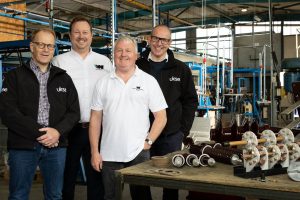Skin in the Game, the rise of Employee Ownership Trusts

According to the Employee Ownership Association, employee-owned businesses are more productive, more innovative, and more resilient to economic turbulence.
Their people are also more engaged, more fulfilled, and less stressed.
With 830 businesses in the UK currently employee owned, their economic contribution is already significant.
This Invest Midlands panel discussion, chaired by TheBusinessDesk.com’s Yorkshire editor Ben Ormsby, heard from three Midlands companies which have made the leap to employee ownership.
On the panel were Dave Hodgetts, CEO of Talbots Law, Barry Aldridge, marketing manager at Flotec Industrial, Gary Ecob, partner at Orbis Partners and Oliver Smith, head of membership at the Employee Ownership Association.
Smith said those companies which have become Employee Ownership Trusts (EOTs) see this as an important way of standing out against their competitors, as the status helps them both recruit and retain talent.
“It’s not a panacea for every single business, but the next generation of employees coming through are looking for something different from work,” he explained. “They are looking for equality and being able to make a difference to their organisation.
“At the moment we’re seeing that one in 20 business sales is through employee ownership and this is mainly in the SME space. This is going to grow and grow.
“By the end of this year we should be nearing 1,000 employee owned businesses in the UK.
“But it’s important to take employees on the journey with you. They won’t feel like owners of the business if they feel the shift to employee ownership is just something that has been done to them.”
Commenting on his own company’s experience of employee ownership, Aldridge said it has given him and his colleagues the opportunity to make the business the best they can.
“It’s a real hook for the younger workforce, they have an opportunity to add value to the organisation rather than just be a cog in a wheel,” he added.
“My experience has been positive but it has to be the right option for your business – don’t make the decision lightly.
“Its critical you get your company structure sorted out before you start down the application process.”
Hodgetts said being an EOT gives his own business an extra level of protection in a consolidating market.
He said: “In the short-term, the benefit of being an EOT means we can pay a certain amount of bonuses tax free every year.
“And in the longer-term the value of what each employee owns will grow as the business expands. That’s a big incentive for staff to stay on.
“To switch to employee ownership is a big move, so it’s abut doing your research and engaging with companies that have already gone through it. Understand what the pros and cons are.”
Ecob said his company was only three months into its own existence as an employee owned firm, but said the change had created a sense of excitement about the business’s future.
“We now have a larger board of directors and we’re making sure there is staff representation at all levels,” he said. “There’s a real buzz and a focus on what people can do to help develop the business.”
He echoed Smith’s emphasis that employees must be fully on board with any decision to switch to an employee ownership model.
“It’s important that you find the right time to engage with your staff,” he said. “It can’t just be ‘we’re changing to employee ownership tomorrow’ – it needs to be inclusive over a longer period.”









